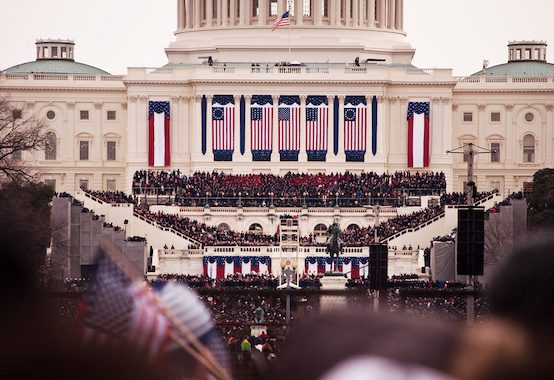Obama’s Inaugural: No Dostoyevsky This Time

I read rather than watched Obama’s second inaugural address. And I came away underwhelmed, but in a good way. There weren’t many memorable lines; the speech for the most part was an anodyne blend of Yankee-doodle-dandyism (“America’s possibilities are limitless”) and vague liberal wish-listing (“The path towards sustainable energy sources will be long and sometimes difficult”).
The president baited the GOP in a couple of places, alluding to its inept Romney-style rhetoric (“The commitments we make to each other: through Medicare, and Medicaid, and Social Security … do not make us a nation of takers”) and congressional Republicans’ intransigence (“We cannot mistake absolutism for principle, or substitute spectacle for politics, or treat name-calling as reasoned debate”). The closest his speech came to lyricism was a passage adapted from Lincoln (“Through blood drawn by lash and blood drawn by sword, we learned that no union founded on the principles of liberty and equality could survive half-slave and half-free”). Obama marked “Seneca Falls, and Selma, and Stonewall” as milestones on the road to equality–but what the president thinks can be done about the inequality that now fires the activists of the left, income inequality, was only faintly indicated. Goldman Sachs doesn’t appear to have anything to worry about.
Obama is not a socialist, and even his view of government power employed to foster creativity and commerce is not much to the left of a 19th-century Whig, or the average Cold War Republican president: “No single person can train all the math and science teachers, we’ll need to equip our children for the future, or build the roads and networks and research labs that will bring new jobs and businesses to our shores.” For good or ill, this is the traditional American formula—capitalism and individualism backstopped and structured by government.
Obama’s remarks on foreign policy sounded chastened, in sharp contrast to the hubris of George W. Bush’s second inaugural, which channeled Dostoyevsky in all the wrong ways. Obama said:
We, the people, still believe that enduring security and lasting peace do not require perpetual war. Our brave men and women in uniform, tempered by the flames of battle, are unmatched in skill and courage. Our citizens, seared by the memory of those we have lost, know too well the price that is paid for liberty. The knowledge of their sacrifice will keep us forever vigilant against those who would do us harm. But we are also heirs to those who won the peace and not just the war, who turned sworn enemies into the surest of friends, and we must carry those lessons into this time as well.
“Perpetual war,” “seared by the memory of those we have lost,” “heirs to those who won the peace and not just the war”—this president has expanded drone strikes into something like an ongoing low-intensity world war, but I think he’s serious about keeping American troops out of wars of choice. My hope is that part of the reason for nominating Chuck Hagel as secretary of defense is that a conservative Republican veteran like Hagel will cement the nation’s resolve to come home from Afghanistan next year, even if—as is nigh certain—Uncle Sam’s friends in Kabul have only the most tenuous grasp on power. Twelve years have not sufficed to quash the Taliban and bring liberal democracy to the Hindu Kush; perpetual occupation doesn’t promise any better result.
Andrew Sullivan finds in Obama’s speech a certain conservatism, and I agree—though I think it’s a different kind of conservatism. It’s a conservatism of default, the result of old ideologies worn threadbare, reduced to warm slogans and halfhearted programs. (Obama’s misspent stimulus was too small for a real Keynesian like Paul Krugman, while Obamacare is closer to the Heritage Foundation’s 1993 healthcare proposals than to Hillary Clinton’s.) “Being true to our founding documents does not require us to agree on every contour of life… . Progress does not compel us to settle centuries-long debates about the role of government for all time.” These words are more a concession to reality than a statement of Oakeshottian philosophy. But then, reality was in short supply eight years ago in Washington, when a president still dreamed of lighting “a fire in the minds of men” with an incendiary ideology of global revolution.
Comments